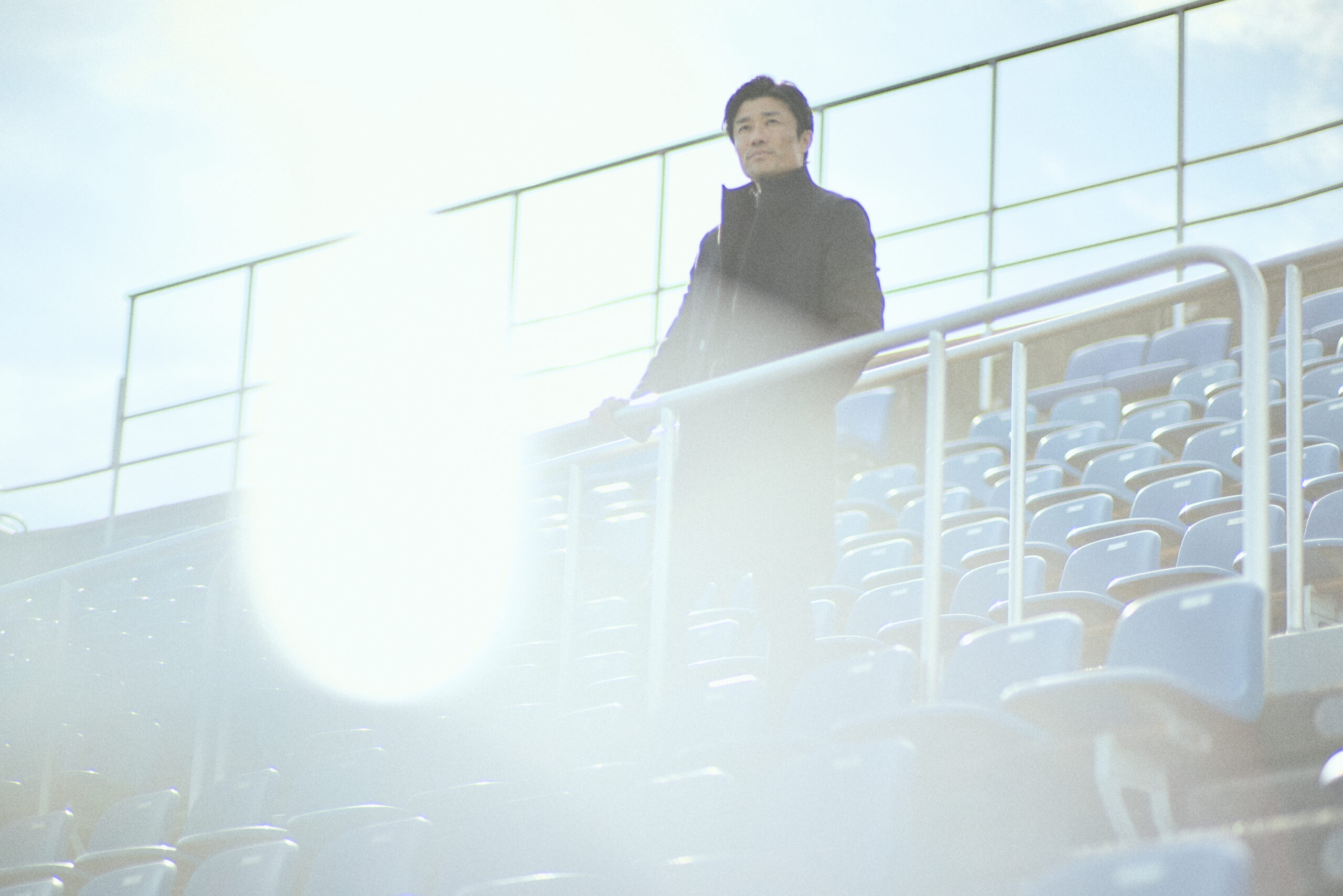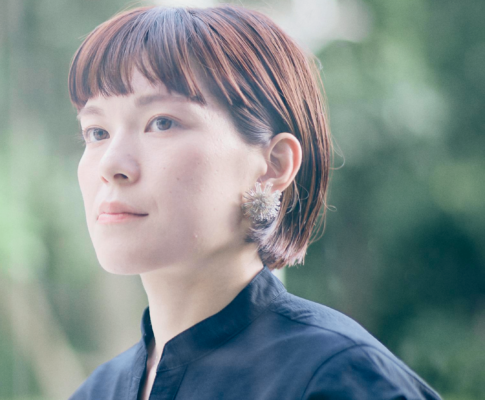目次
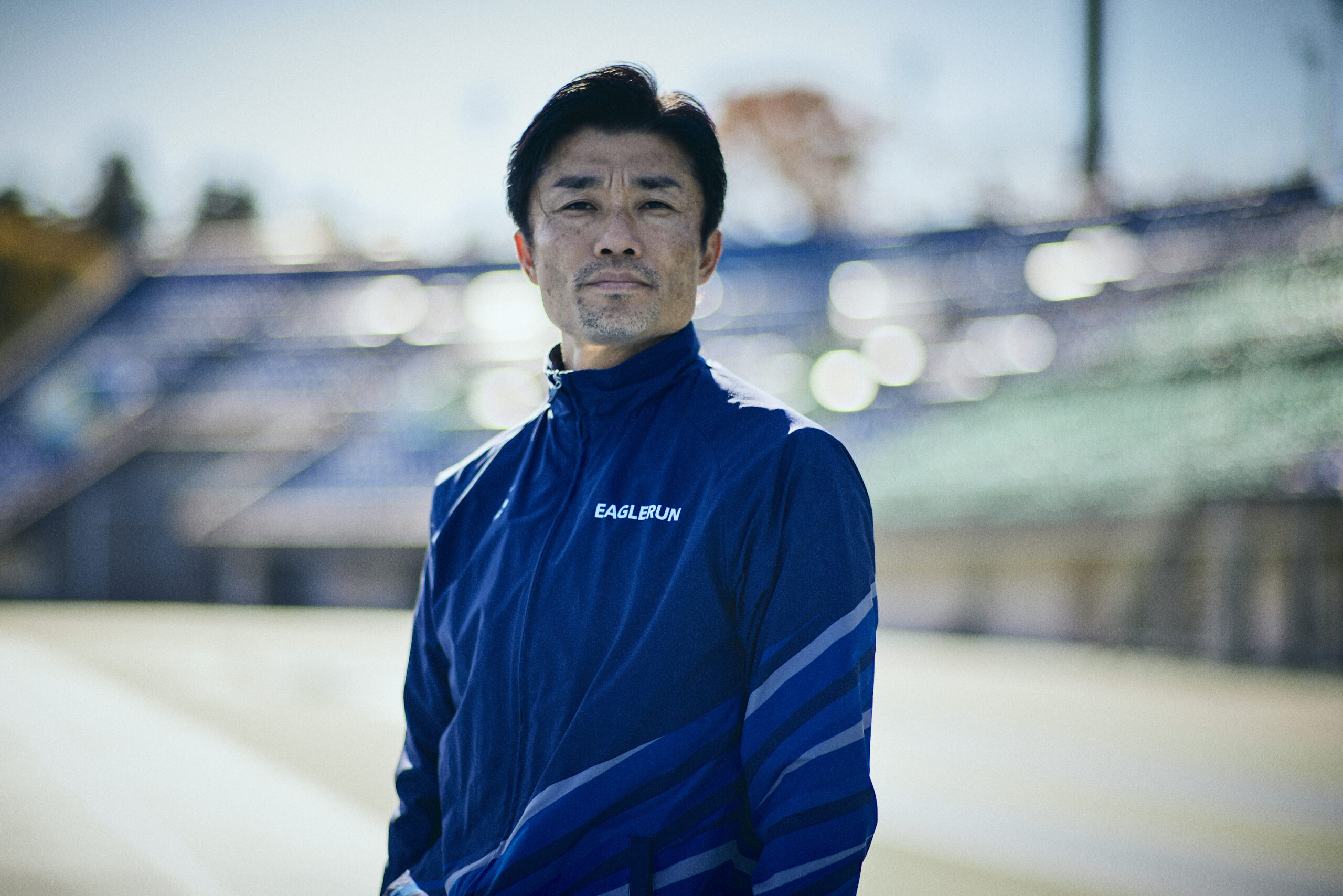
Shingo Suetsugu
Born in 1980 in Kumamoto prefecture. Men’s 200m Japanese record holder (20.03 seconds)
After attending Kyushu Gakuin High School and Tokai University, joined Mizuno Corporation. Completed graduate school at Tokai University through in-house study abroad program. Became independent as a professional track and field athlete in April 2015. In 2018, he launched “EAGLERUN”, which expresses his world view of running, and in addition to his activities as an athlete, he also teaches the younger generation.
Participated in four World Athletics Championships and three Olympic Games. Only sprinter in Japan to have won medals at both the World Athletics Championships and the Olympics.
“44 years old, competitor”. Achievements and individuality that have been built and refined. In 2025, “Only One” legend will shine in a unique way.
Something that can be enjoyed with selfish feelings
――You announced your intention to compete in the World Athletics Championships Tokyo 25 in November 2024, but what made you decide to make the announcement?
Actually, I was thinking of aiming for the Paris 2024 Olympics, and I was working on various things, including preparations. However, in order to do this, I will need support from various sources. Generally speaking, at the age of 44, people sympathize with the idea of aiming for the Olympics or the World Athletics Championships, but it is difficult to gather support unless the results are guaranteed. I trained as much as I could during that time and was able to run with a time of about 10.6 seconds. My fire has not been extinguished, and I am confident that I can continue to improve my running skills. However, I knew that I couldn’t do it on my own, so I worked hard to find sponsors, but I felt that I needed to speak a little more clearly to the world in my own words. How many people will respond to my challenge now? So when I announced that “I would take on the challenge”, the response was greater than I expected. Up until now, I had not been able to find something on my own, but now that I have declared it, I have found people who want to support me.
――What is the reason you decided to take on the challenge?
I wanted to find out what Japanese people are looking for in sports these days whether it is a story that is easy to understand, or a story that has a backbone like mine and takes on something that is only risky. I am taking on this challenge with the intention of standing on the world athletics stage, but the process is also important. Through sports, various life stories are intertwined, and what kind of emotion will be born after it all ends.
I can pretty much imagine the current sports scene in Japan. I think it’s easier to understand, and it makes sense if it’s commercialized. But real sports and challenges are interesting because you can’t see what’s ahead. Because you can’t see what’s ahead, you can freely create your own story during that time. Some may say that this challenge is “impossible”. But in my opinion, sports are “things that can be enjoyed with selfish feelings”, and “things where the outcome is yet to be determined”. I intend to express this with all my heart and soul at this year’s World Athletics Championships.
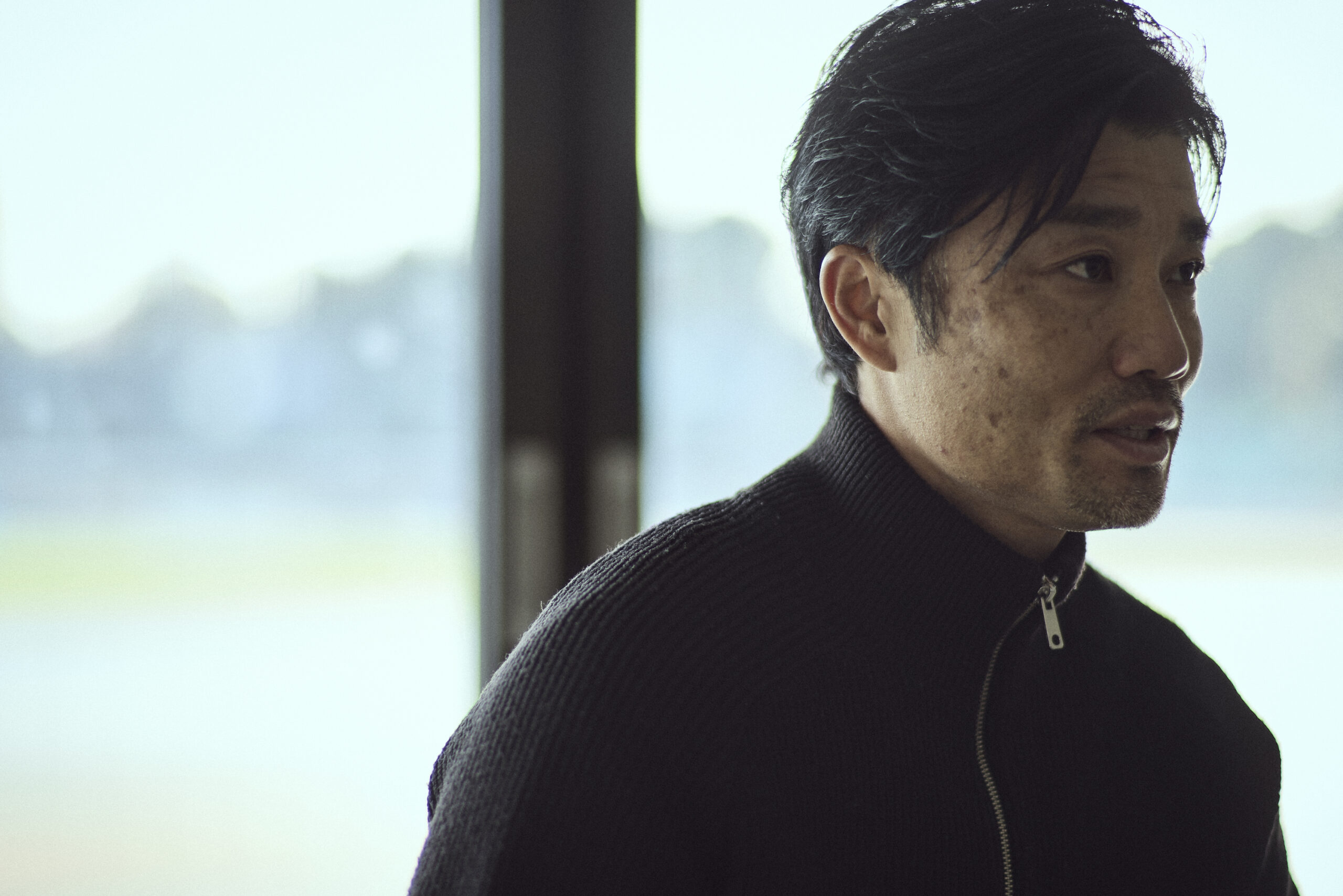
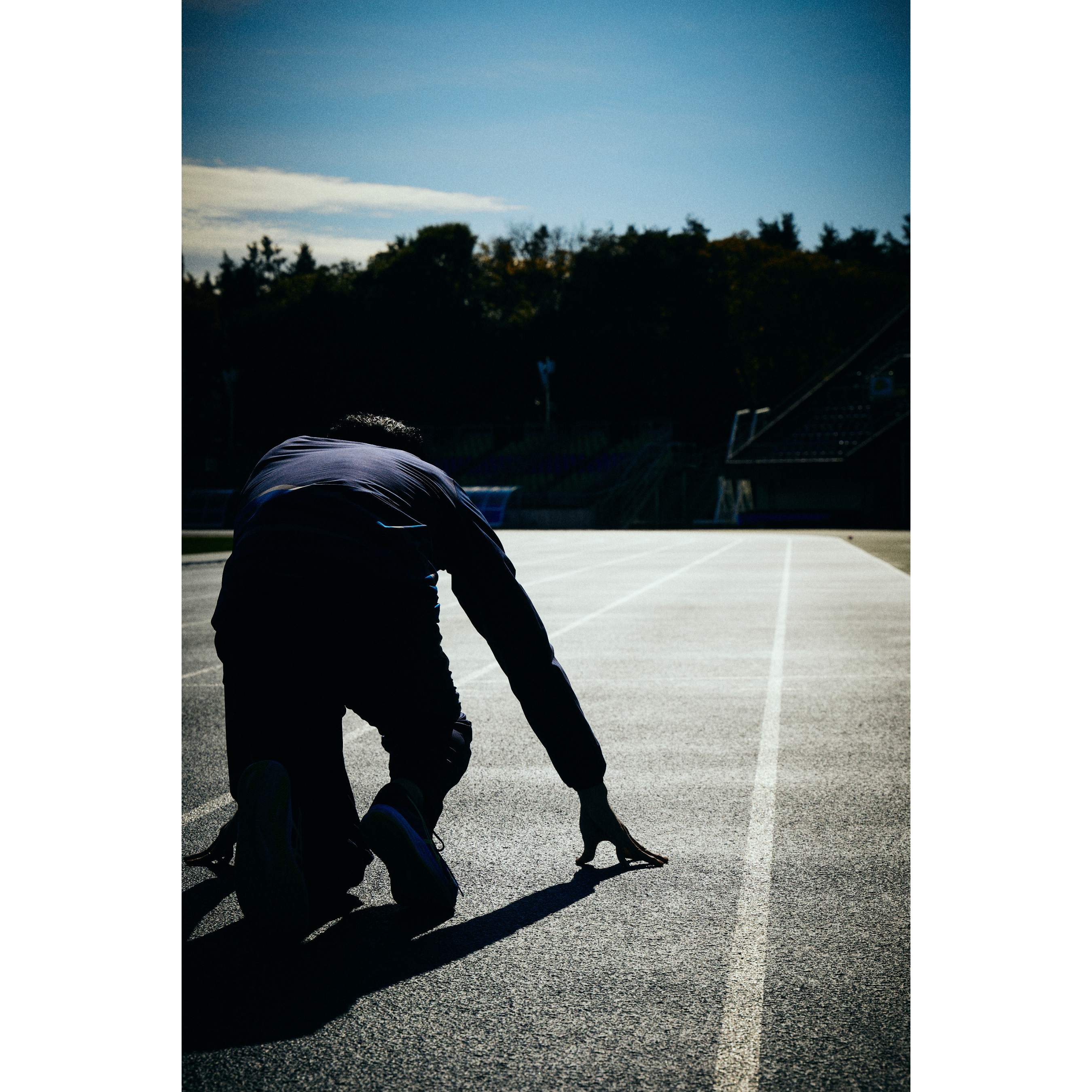
What kind of story will be spun from here?
――What is the “challenge” for you ?
When you are young, you have high competitiveness, so there are various stages available for you, including the World Athletics Championships. But on that stage, all I was thinking about was winning, and I didn’t feel 120% “grateful to be on this stage”. That’s why I continue to compete. When I was in my 20s, I knew the result before I ran, but now I really don’t know what will happen. It’s really scary when that happens. This is the difference mentally between now and when I was in my 20s.
At that time, I carried the prestige of my country on my shoulders, running for the country, companies, and people with whom I had various connections, including my coach, Susumu Takano. I could never run just for myself. The project that the government asked me to do was completed with the result of winning a silver medal in the 4x100m relay at the Beijing 2008 Olympics. It makes me proud of what I’ve done. However, as long as I run as an Olympian, it’s a lot more like an “obligation” than a “challenge”.
But it’s not for anyone right now. Shingo Suetsugu runs because he is “Shingo Suetsugu, who loves running”. Regardless of whether I could do it or not, I thought it would be wrong not to take on the challenge of competing in a competition to decide who is the best in the world. The “real challenge” for me is to go for what I want to do from the bottom of my heart. Therefore, this may be the most exciting time.
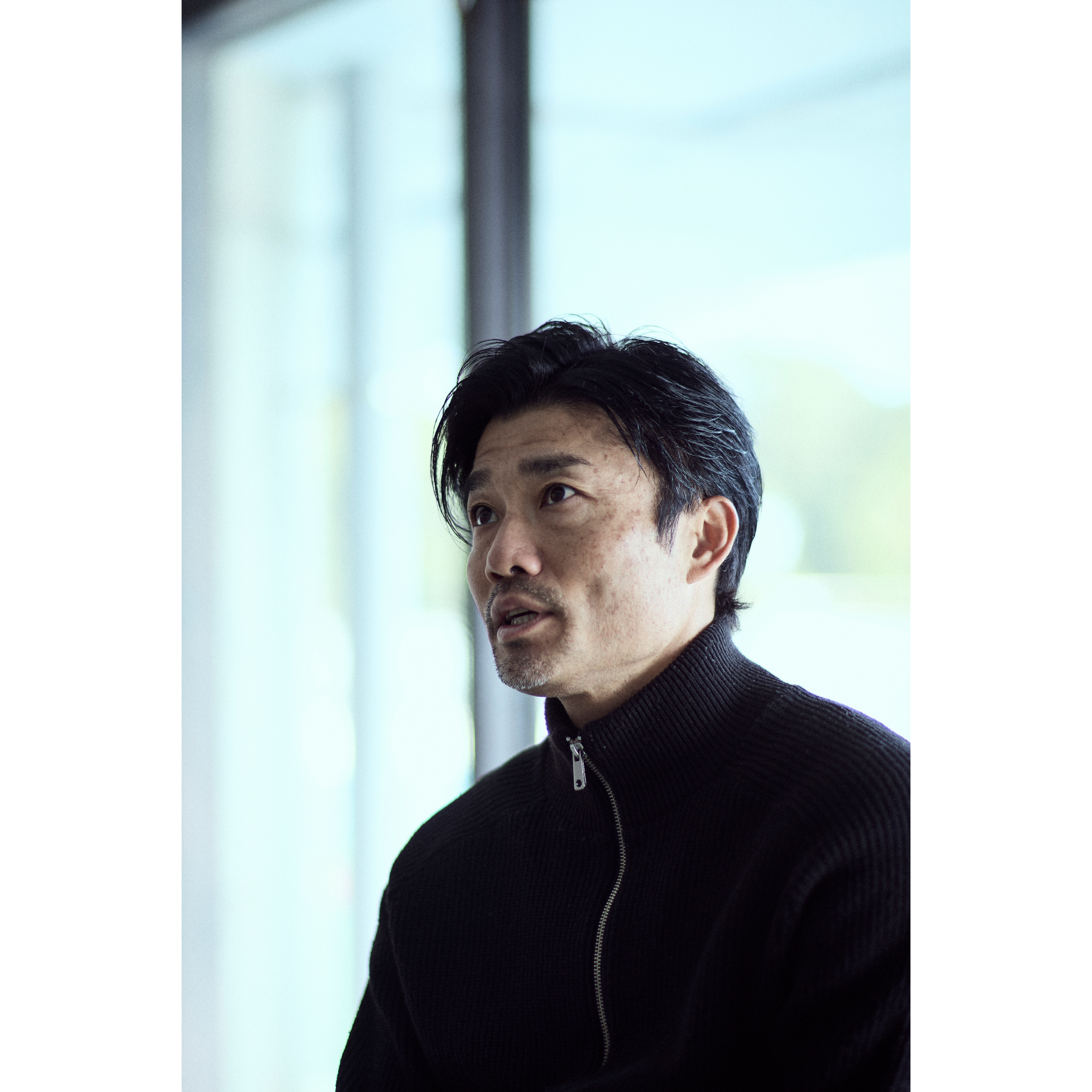

Enjoying a “real challenge” without being tied down by anything.
I am very well-rounded, but when you look at it under a microscope, it looks jagged.
――The other day, I interviewed Yuma Maruyama, a decathlete, and he said that your advice, “You are too rounded. Be a squarer mountain. Try to be a sharp one” really resonated with him.
He’s fundamentally kind. He has a calm personality and maintains a balance in many areas, including interpersonal relationships. But when he thinks about being the best, a mild-mannered person like “Maruyama” is not a threat. However, if he is too aggressive, he will end up sharp to one point. Personality-wise, he’s not that type of person, so I wanted to give him a little edge, so at first I thought of “hexagonal circles” and “decagonal circles”, but I think there was a lack of word sense. So when I said, “Don’t be rounded. Be a squarer mountain” he said, “That’s true!” You don’t need to be aggressive, but you should be a little more assertive and say, “This is how I am”. To be seen as a threat is to be seen as a rival. Even when I watched his attempts, he was able to do all the events at a high level, but there was no event that stood out, and I thought he still lacked the skill. When all the corners become big, it becomes a big circle. That’s why I said “Don’t be rounded. Be a squarer mountain. Try to be a sharp one”. Since then, I feel that something has changed in him little by little, and he has become more tolerant.
――When I heard that story I thought “why isn’t it a triangle mountain”, but it wouldn’t have been good if it was too sharp at one point.
Yes, that’s true. If you tell a young child to “become sharp triangles”, that’s all they will do. “Don’t be rounded. Be a squarer mountain” is a word for him. There are many different ways of saying things when coaching, and the way things are communicated is completely different depending on the athlete. Yuma Maruyama is smart, but he also has a strangely boyish side. I feel like I took the middle ground and conveyed my message.
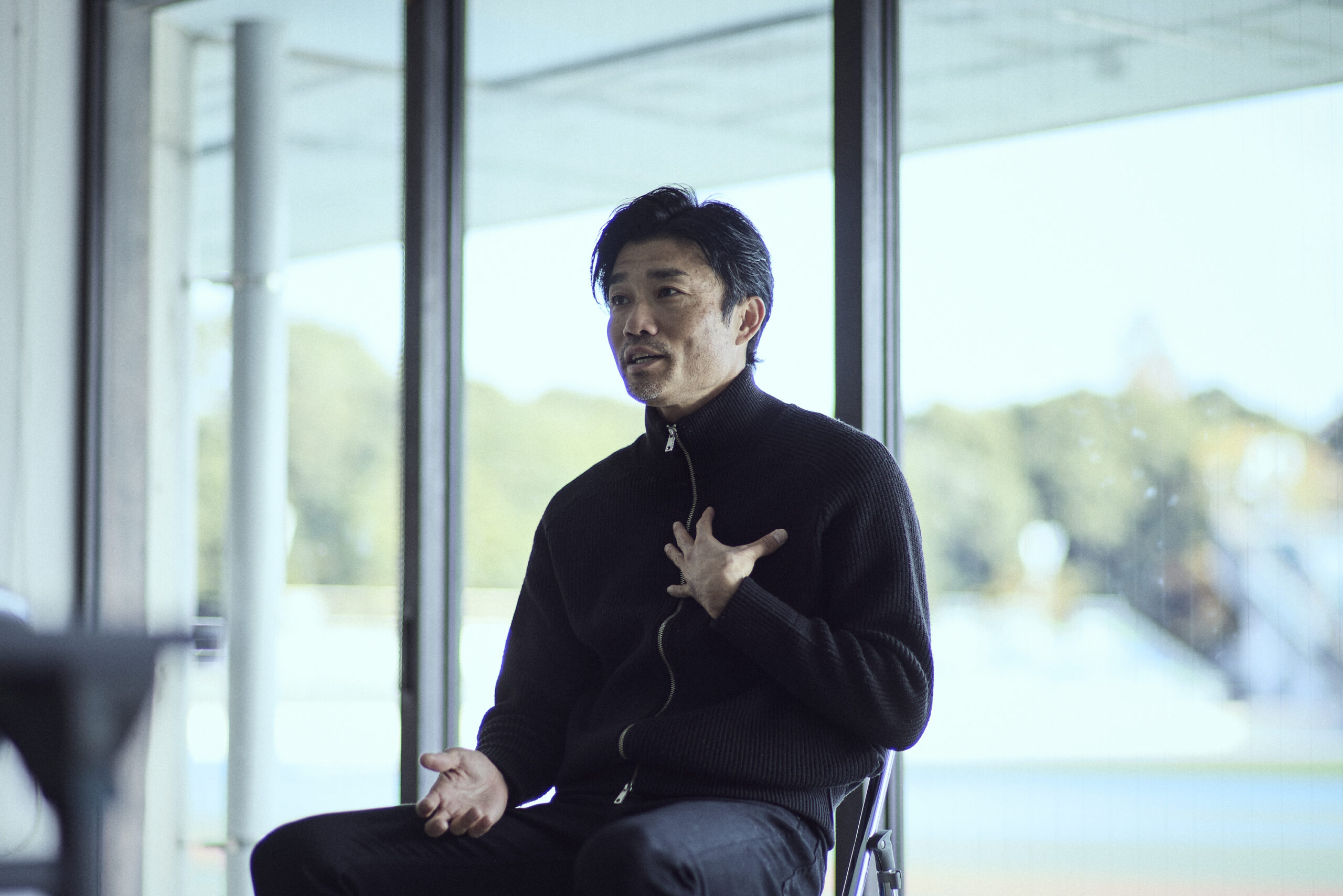
Word sense unique to Shingo Suetsugu.
――Do you feel yourself as aggressive now?
No, I am very well-rounded, but when you look at it under a microscope, it looks jagged. It’s a strange feeling. There are some parts that will break if you touch them, but I think that’s something that needs to be protected. I guess I’m just being aggressive after all.
――If you weren’t aggressive, you wouldn’t take on this kind of challenge.
Now that I’m a competitor, I become aggressive when I have a strong desire to “win” or “be the best”. I have to refine that. But if I become too aggressive, it will break, so I want to keep it that way. However, from now on, we will have to train the next generation and accept people. In that sense, I think I have become more well-rounded and mature, but even now when I am coaching, I don’t mind fighting with athletes. So I guess I won’t be completely well-rounded and mature yet.
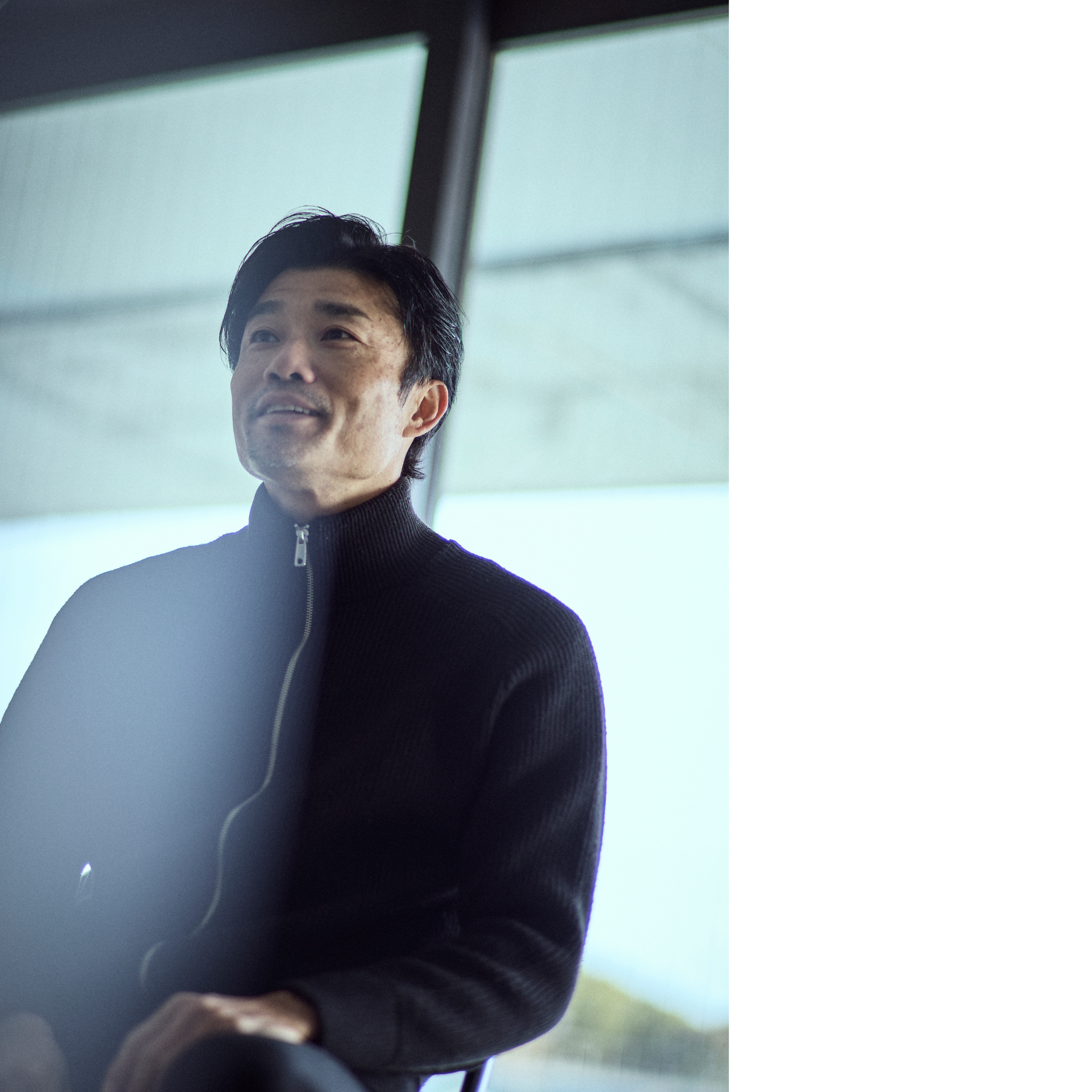
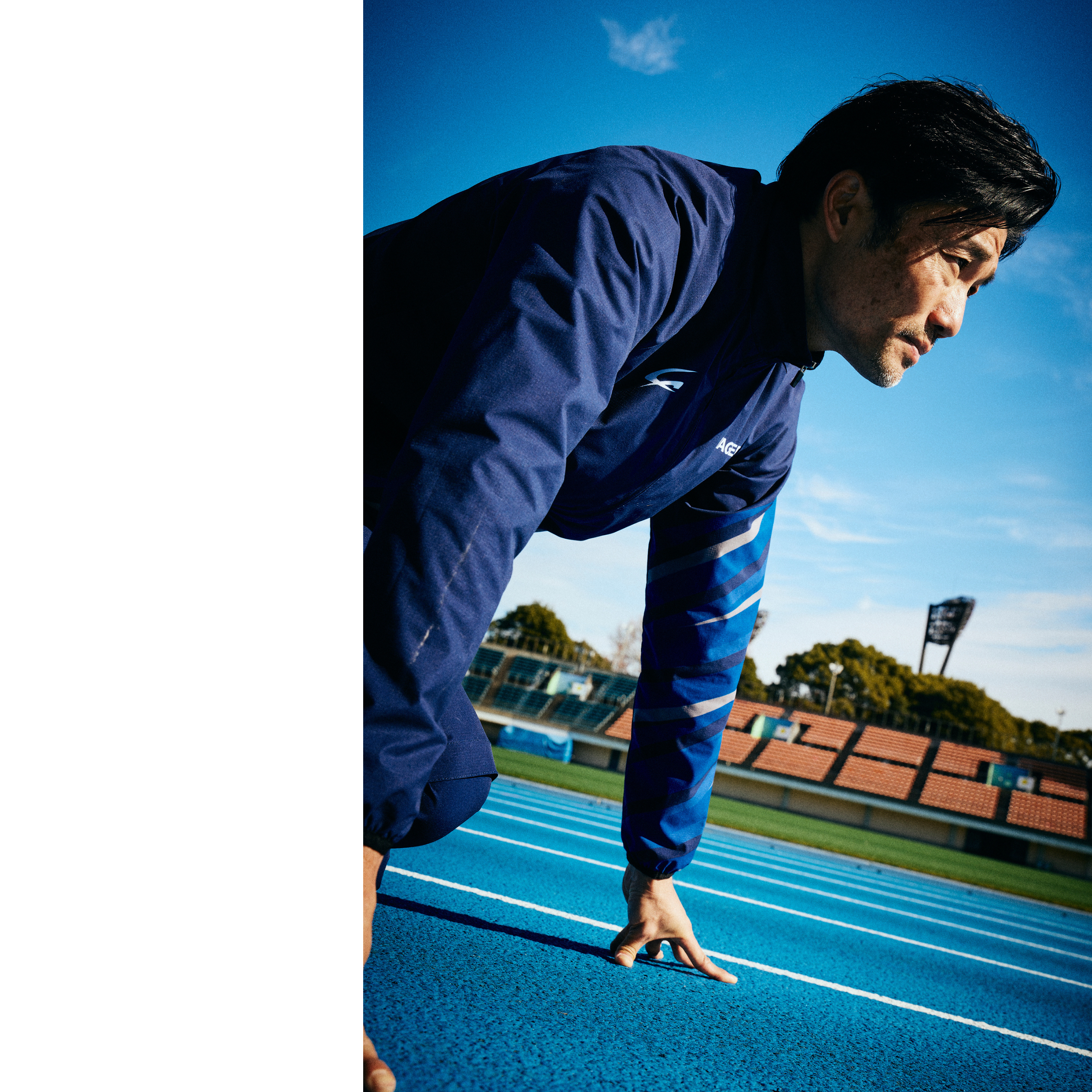
Keep running while refining himself without being too aggressive.
I stopped making excuses to cool down the passion in my heart
――How do you plan to spend the next year leading up to the World Athletics Championships?
In any case, I would like to make this year a year where I “cherish my encounters”. People can only change themselves, so I want to create something through each encounter. The same goes for this interview. When I meet with people from the Tokyo Metropolitan Government and get this message out there, some kind of impact will be born. Then, a different story will be created, people will connect, and it will be communicated. By repeating this process, we will create a big vortex, and what kind of “World Athletics by Shingo Suetsugu” will be created. I’m looking forward to it.
――You have also won a bronze medal in the 200m at the World Athletics Championships in 2003 and have participated in the tournament four times so far, but what kind of tournament is it for you?
Shingo Suetsugu’s content is often more concerned with turning points and milestones in life than the Olympics. In 2007, the tournament was held in Osaka. The people of Osaka were supporting me as a person, but I wanted to achieve results as a competitor. But I couldn’t achieve any results, and I think I was feeling depressed. At that time, I felt like I couldn’t accept that kind of support… Then, when I was 37 years old, the Japan Championship was held in Osaka, and there were a lot of people cheering me on in the Kansai dialect and saying, “Hey, you’re back!” In that sense, looking back, the 2007 World Athletics Championships in Osaka was quite a big tournament mentally. Since it was being held in my home country, everyone around me was excited, and that’s why I also felt a sense of fear. But right now, my passion is definitely greater. They will probably have a completely different perspective on hosting the event in their own country than they did at the time, and I think they will be able to face the situation while conveying what they were unable to say at the time.
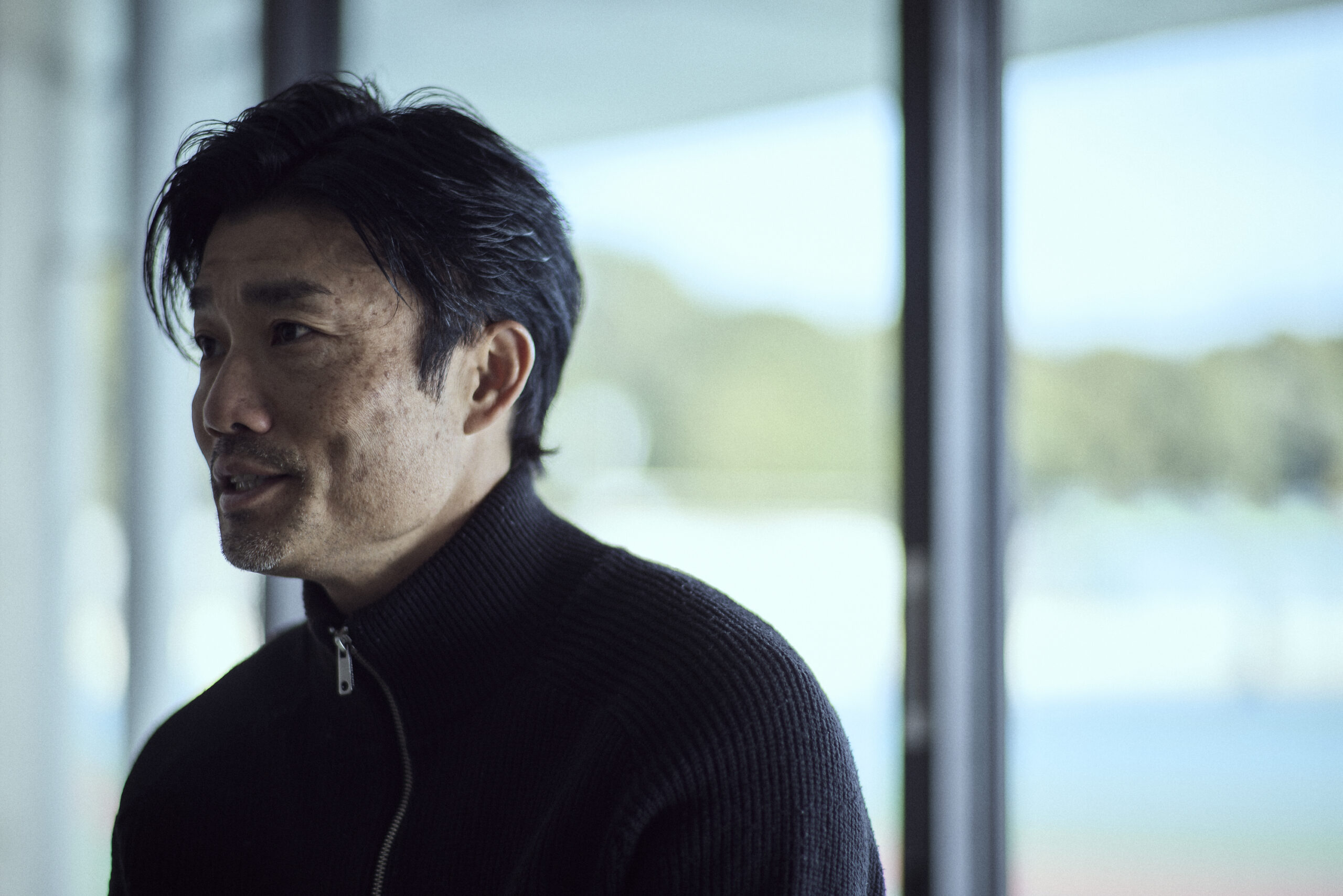
He is one of a kind.
――I think you will continue your competitive career, but please let me know if you have any dreams or goals for the future.
My lifelong dream is to stay healthy and run 100m even after I’m 100 years old. Fulfilling the obligation of results is a major premise, but more than that, I want to use my own body to create a world of sports where everyone finds value in the fact that “this challenge is interesting and exciting”. I want to use various methods to create a new way of relating to sports and a new sense of value that is not just about results. When I look back on the past, I was born in an era where the mindset was “Japanese athletes can’t beat African athletes and can’t make it to the finals”. But that has overturned. I feel that in my life I have changed that paradigm in tangible and intangible ways.
When you are in your mid-40s, you start making excuses for various reasons even though you really have something on your mind, and your heart no longer ignites the fire. I stopped using that as an excuse to cool down. On the contrary, we are a generation that can do well. Today’s teens and 20s have experienced the coronavirus pandemic, and it is difficult to see what the future holds. I’m sure some people over 60 are dreaming, but they have to live fully in the present. But people in their 40s and 50s are physically strong, still in their youth, and are able to have dreams. Wouldn’t it be boring if this generation didn’t do something outrageous? If you show that kind of thing, the older generation will say, “Young guys, do your best!” and the younger generation will say, “You guys are doing your best”. One of my seniors pulled a muscle after he started running inspired by me. I want you to be careful about that, but children will proudly say, “Dad, you’re cool”. I think that’s what children want to see, and I want to be an adult who keeps doing stupid things.
――I’m thinking of running from today too!
Be careful not to pull a muscle.
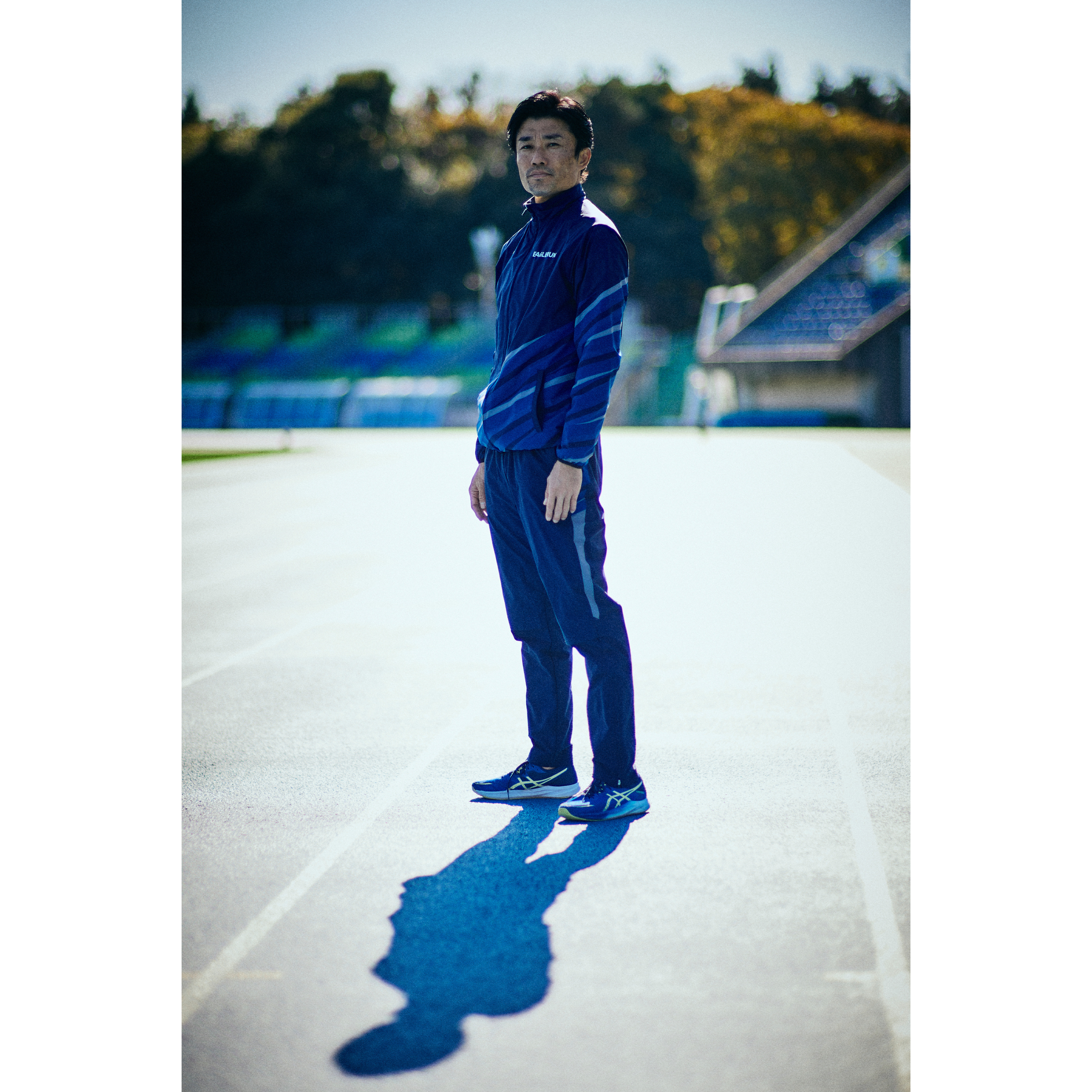
Honest talk with my buddy, “Komaru”
――How do you usually spend your days off?
I have a pet dog. He is a miniature dachshund and his name is “Komaru”. I’m so busy that I can’t really play with him, but on my days off, I go to a cafe with my buddy, Komaru. I also write, and it’s at times like these that ideas occur to my mind. Komaru was well-trained when he was young, and he doesn’t make any noise when I’m thinking. When I try to play with Komaru, he climbs on my lap. Right now, I feel like I’m valuing the time I spend with my buddy, Komaru.
――What kind of time is it for you spending with your buddy, Komaru?
I don’t think “true feelings” are expressed through words. Because dogs can’t speak, they understand the truth. That’s why I feel like I’m having an honest conversation with Komaru. It’s kind of a strange story though. My buddy understands what I only think in my heart and act on it. When I am thinking, “I didn’t do well in practice, what should I do?” Komaru stares at me. And after I finish thinking, Komaru will bring me a toy. Komaru can understand my feelings. I dare to say it’s just two people, but the two of us are having honest conversations. Honest communication is the best way to relieve stress. Because humans speak the same language, we may not be able to see what people really think. But humans and dogs are different, so some things come out that are not fake.
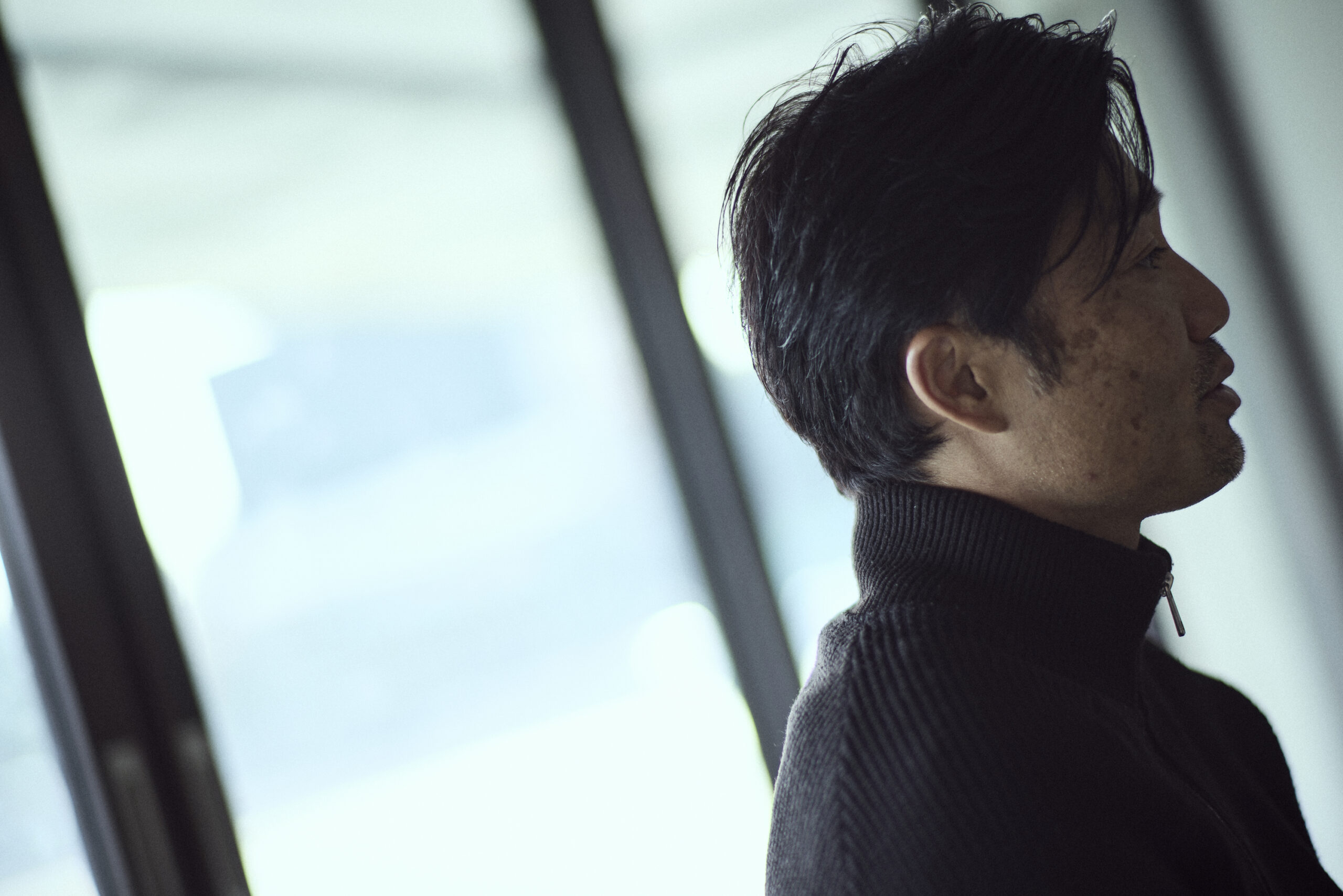
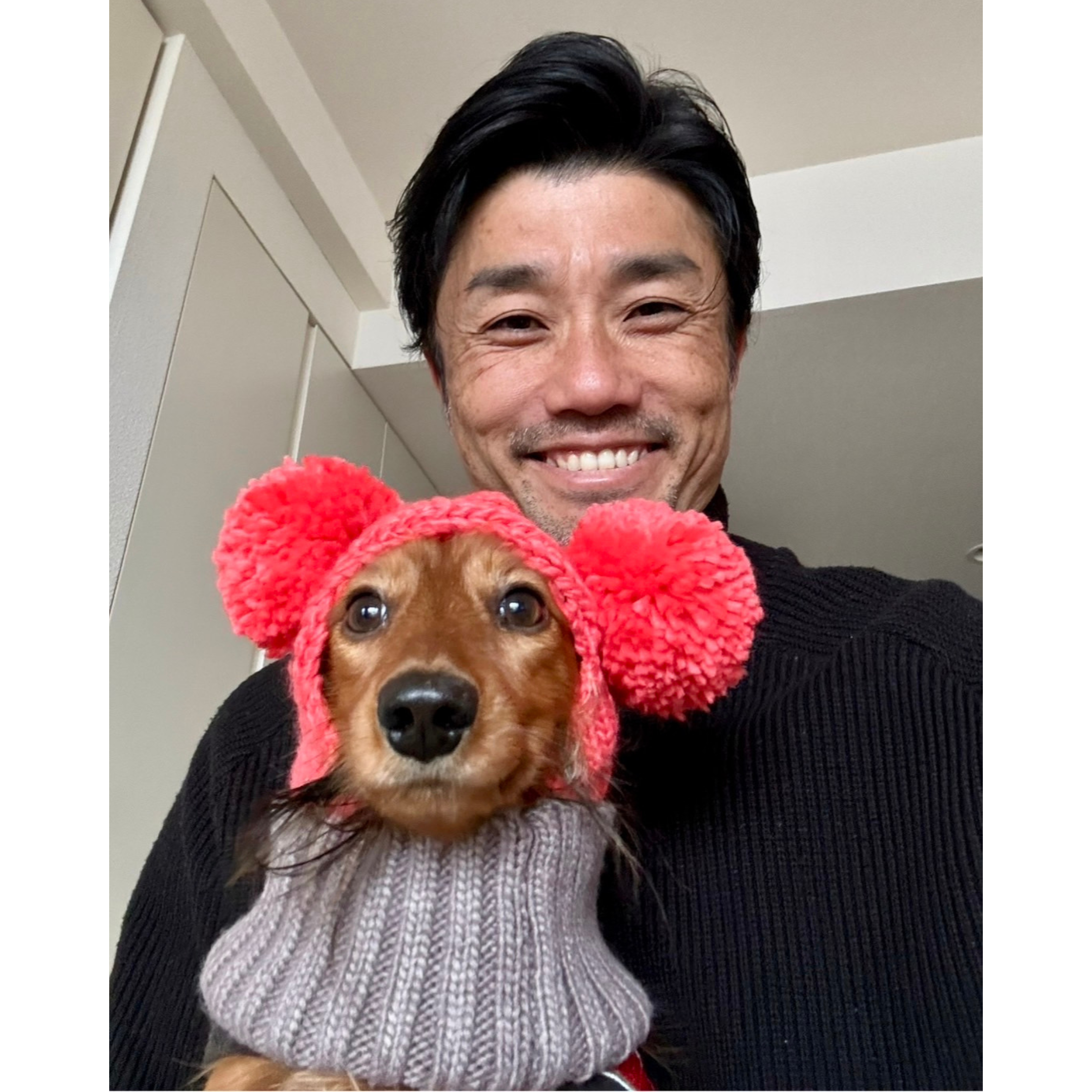
*Courtesy of Shingo Suetsugu
――When did you start keeping Komaru?
It was around the time of the coronavirus pandemic. When I casually went to the pet store, my eyes suddenly met and I thought he was cute. However, for about 6 days after that, I couldn’t get him out of my head and couldn’t sleep. So I went back to the pet store and he was still there. At that time, I thought, “I will take him home now”. It went beyond love at first sight to the point where I thought about it for six days straight.
Komaru is similar to me in some ways. When dogs are unwell, they curl up in their weak spots, making a “curl“. Once, when I caught a cold at the same time, I slept in the same position. This is the position to quickly recover. Animals are amazing, aren’t they? They speak to us with instinct rather than words, and they see things that humans cannot see. That’s why I like him. It’s been 5 years since I started keeping Komaru, and now I can’t imagine life without Komaru.
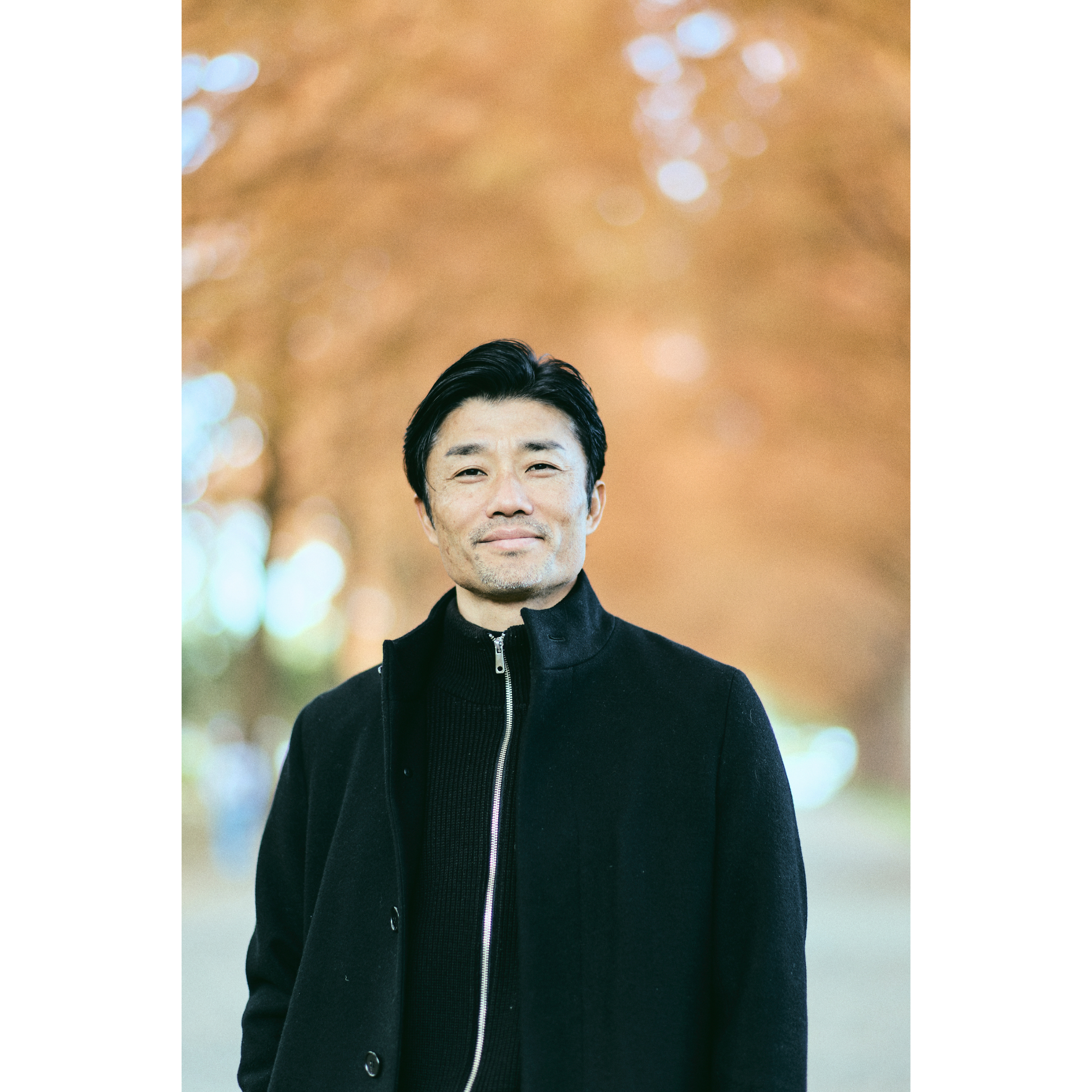
I am a gullible person
――As I was listening to your talk, I felt that your word sense and ability to verbalize was amazing, but how did you come up with so many words?
I have always been good at making mental images come to life. If I hadn’t pursued track and field, I think I would have gone to an art university. I’m a creative type of artist to the point where I wasn’t sure which one to choose. I also like pottery and modeling. Now it’s just the body and words. Also, some of the students I teach are from Kansai area. They are so interesting. Their story was good, and I may have been polished by their originality.
――Have you always been good at putting into words?
No, I used to be bad at it. There was a time when I couldn’t run, but I was able to solve the problem by “talking”. I started talking to live. I think that’s the case with anything. I can’t survive if I don’t speak when I am abroad. If I don’t convey my words in any way, I can’t prove that I’m Shingo Suetsugu. I had a breakdown in my identity a long time ago, so I refined it through writing and speaking. I think there were things that I had originally, but I also think that there were things that I acquired.
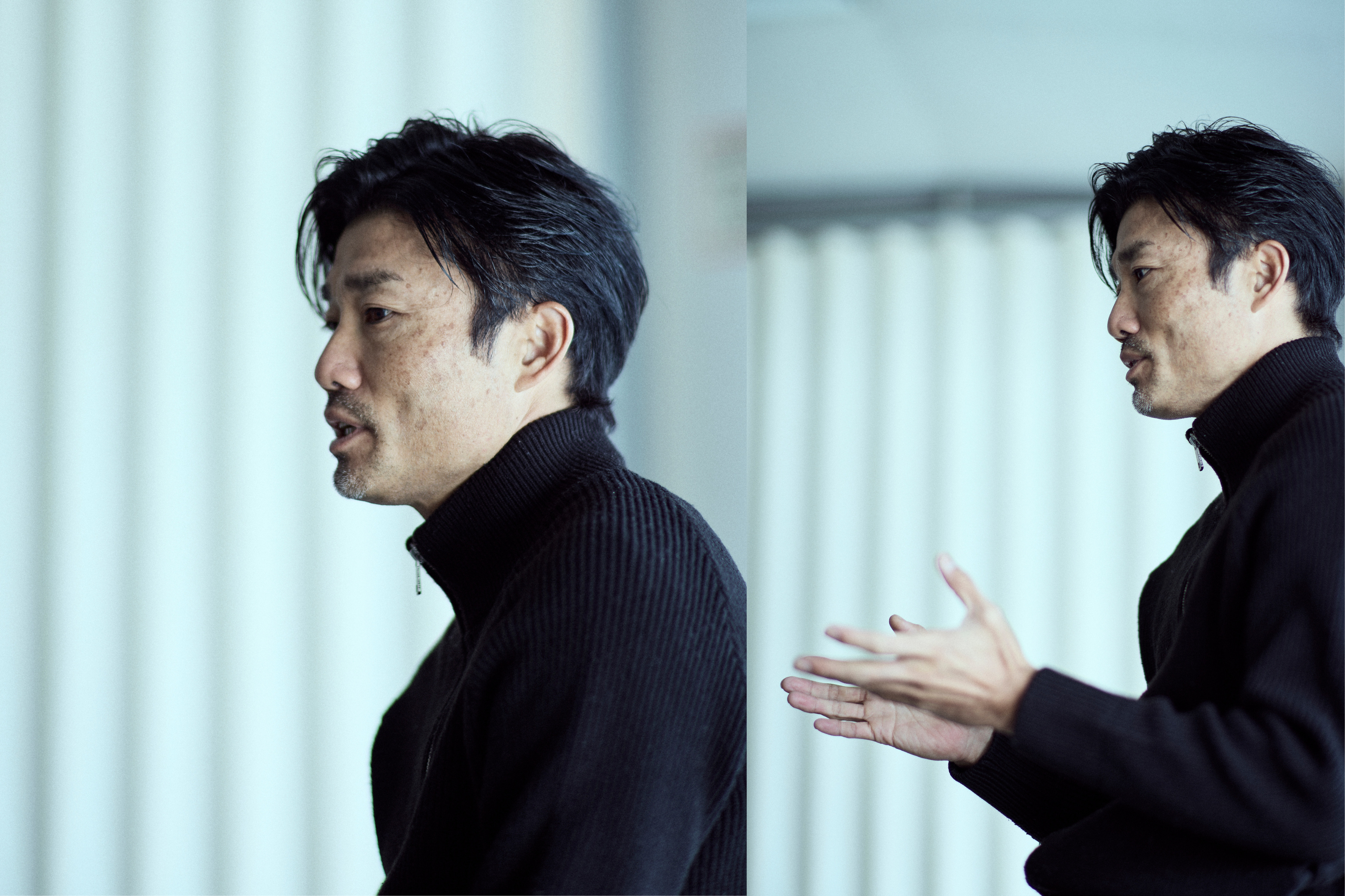
――Have you been into anything lately?
I’m hooked on Instagram! I’ve always been bad at it, and I had a negative impression against the social network service, but when I tried it without thinking about it, it was surprisingly fun. I thought this is how we meet people by putting on music and writing texts. Before, I had a flip phone, and I was worried about whether it was okay to mention or follow someone, and whether it would look like a pick-up… In other words, because I focused on analog human relationships such as obligations and relationships, I did not recognize that it was a cultural thing. However, the world of social network service is a much lighter information space, so I think it’s actually good to have more freedom. Also…I’m obsessed with dog clothes.
――Dog clothes?
Dog clothes are more amazing than you think. It’s surprisingly…high price. Of course I choose the right clothes, but the price is no different from the price of my clothes. There are some clothes that I put money into. There’s a store that sells clothes for dogs, and the staff at the store love dogs, so they take great care of them. I was fascinated by them and ended up buying them. That’s why I’m a gullible person and easily tricked by that store. I end up buying it right away, so I try not to go there as much as possible.

*Courtesy of Shingo Suetsugu
“Aa-su”, A magic word that connects people
――If you could recommend an athlete other than yourself, who would it be?
It would be Ryota Yamagata and Yuma Maruyama. Regarding Ryota Yamagata, while I was resting in my hometown in Kumamoto, I suddenly got a call through a junior colleague asking to visit Kumamoto. This was around the time he was around 20 years old and participated in the London 2012 Olympics. I don’t know whether he came here to learn something, but I thought, “This is what strong and fast people have after all”. Act without thinking about what happens next. It was our first time meeting, but I picked him up at Kumamoto Station and drove for about 2 hours. Rather than talking about the competition, I talked about sensitive parts of myself. The next day, there was a commemorative party at my high school, so I invited him to come, but Ryota Yamagata got gastroenteritis that night. The person who arranged my hotel room was a pharmacist, so I got some medicine and let him sleep, and the next day he felt a little better, so we talked about the competition again. I had the impression that he was an honest boy who didn’t think about what happens next and was a boy with full power, but since then he has rapidly gained strength and is now the Japanese record holder for the 100m. Despite suffering serious injuries, he has faced not only his record but also himself. I think the way he continues to run and believe in himself is a true Japanese record holder, and I think this is the strength of Ryota Yamagata.
――What about Yuma Maruyama?
I think Maruyama has been under a lot of pressure since he was originally said to be a person with great talent. It had been difficult for him to bloom, but he persevered and finally fully developed his talent. Athletes who have high expectations will give up and quit if they don’t get results. But he didn’t give up and radiated positive vibes. Like Ryota Yamagata, he has a solid heart. I purposely included their names because I wanted people to know more about their backgrounds before watching the World Athletics Championships Tokyo 25.
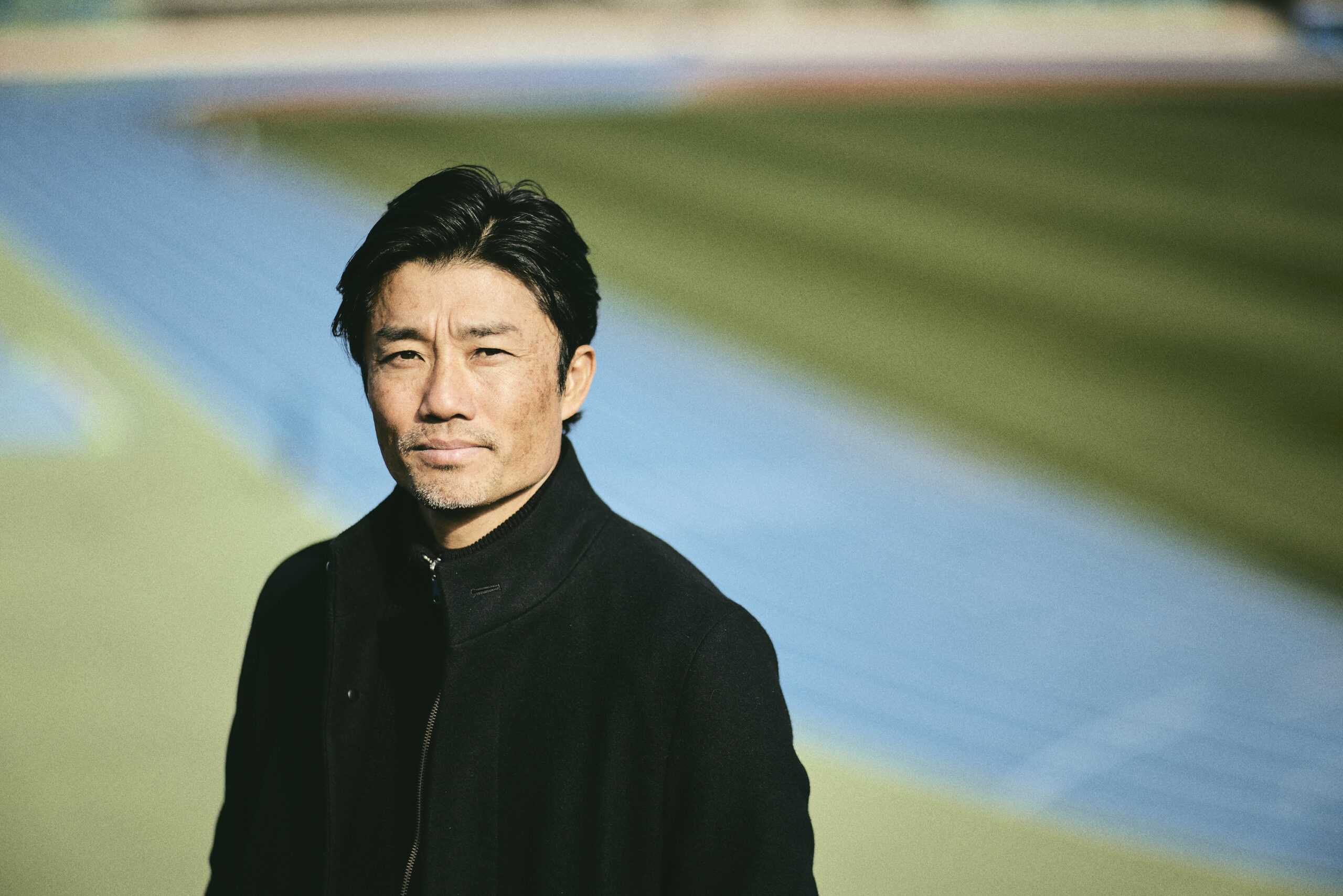
As the 100m Japanese record holder,
the way he continues to run despite serious injuries,
there is some overlap with Shingo Suetsugu.
――What does the word “Aa-su” used on the social network service etc. mean?
My alma mater is Kyushu Gakuin High School in Kumamoto, and back then we played baseball during recess, and the relationships between teachers and students were very close. For example, if an alumnus opens a store in Tokyo and a graduate of Kyushu Gakuin High School comes to visit, the connection to his alma mater is so strong that he will say, “Are you from Kyushu Gakuin High School? Then I don’t need any money”. There, the greetings such as “Good morning (Ohayo-gozaimasu)” and “Thank you (Arigato-gozaimasu)” are all abbreviated to “Aa-su”. Even when you get angry, saying “Yes, I’m sorry (Sumimasen)” becomes “Aa-su”. In other words, “Aa-su” is a word that encompasses everything in terms of relationships with people. At that time, it was only used within Kyushu Gakuin High School, but when I came to Kanto area and started using it, it spread even further… There is a mixed martial artist, Rumina Sato, in Odawara. And martial artists greet each other by saying “osu”. We both thought that “Aa-su” might be better than “osu” and talked about it a lot. Then, it started to walk on its own, and now elementary school students in Odawara are saying it. The other day, So Takei also said “Aa-su” and it is also used in kindergartens and nursing homes. Lately, I’ve been getting requests like, “can we use this?” It’s a word that easily connects different people. Everyone, please use it to the extent that it is not too persistent!
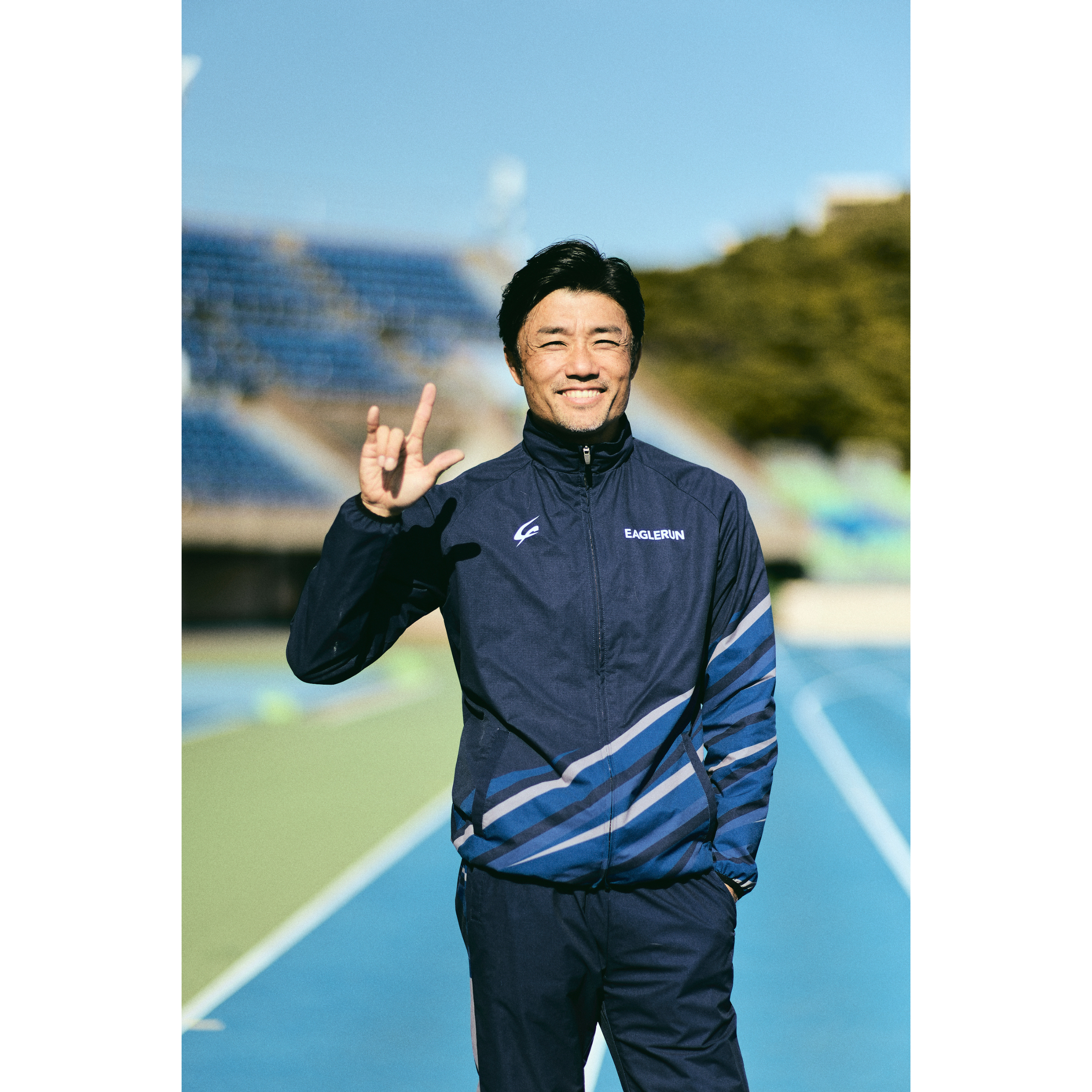
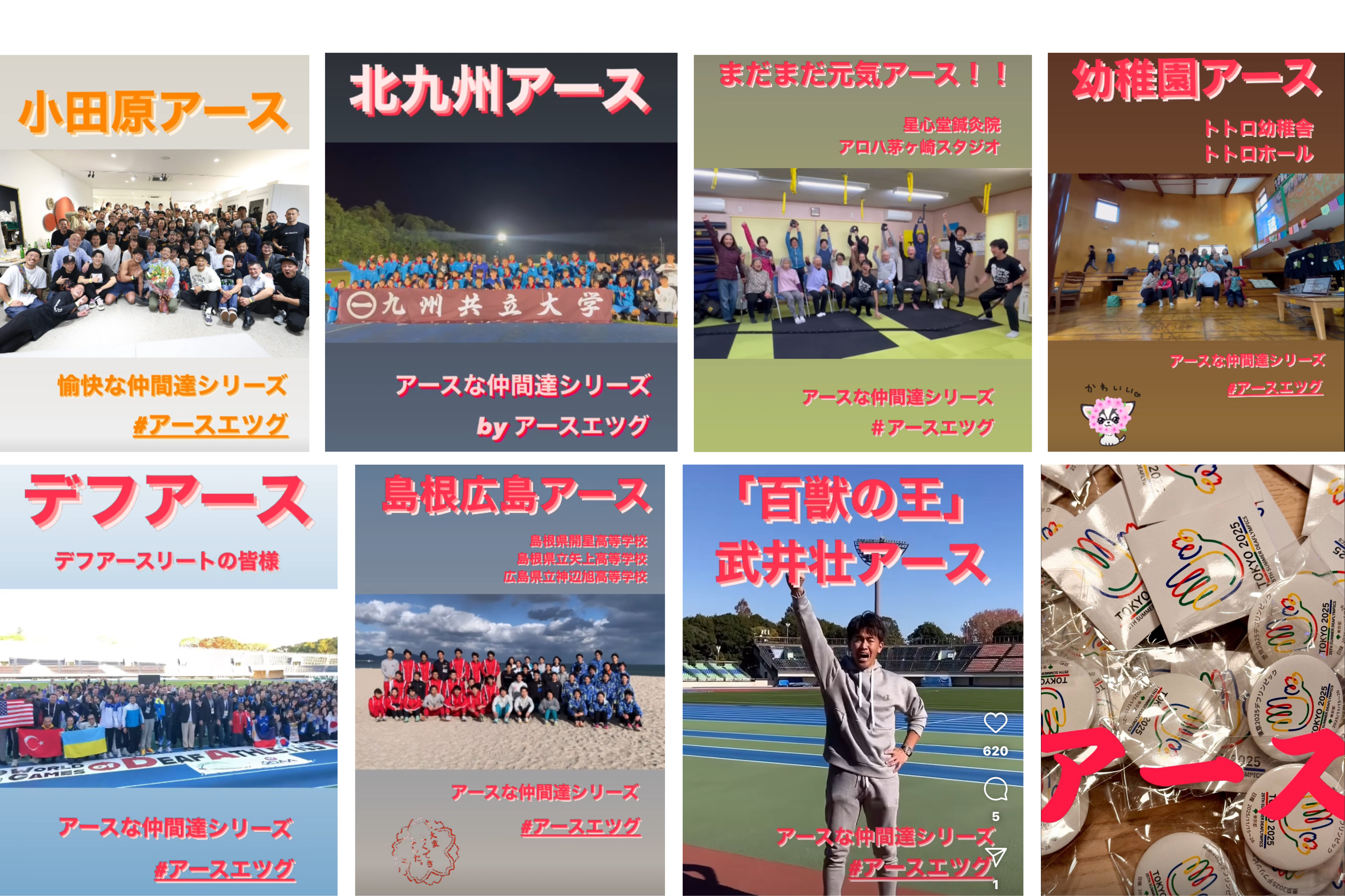
Will it be the 2025 Buzzword Award…?!
――Finally, please give us a message for our readers who are looking forward to the World Athletics Championships Tokyo 25!
There is the World Athletics Championships that you have all been watching so far, and of course you will moved by the fast athletes and the athletes who can hit the ball far. But it’s not just those athletes who are memorable. You need to find a “favorite” to find it. I think it will become more interesting if you pay attention to world athletics that is created by the athletes and their backgrounds. I am the same, Yamagata is the same, Maruyama is the same, and if you follow each athlete’s backbone and story and watch them including their connections with other athletes, you can really resonate with them. I hope you enjoy it that way.
You wouldn’t go to the National Stadium venue unless you had a chance to go. I haven’t run yet either. So I’m really looking forward to it, and I want to experience “my first National Stadium” together with everyone. Please come and visit the National Stadium!
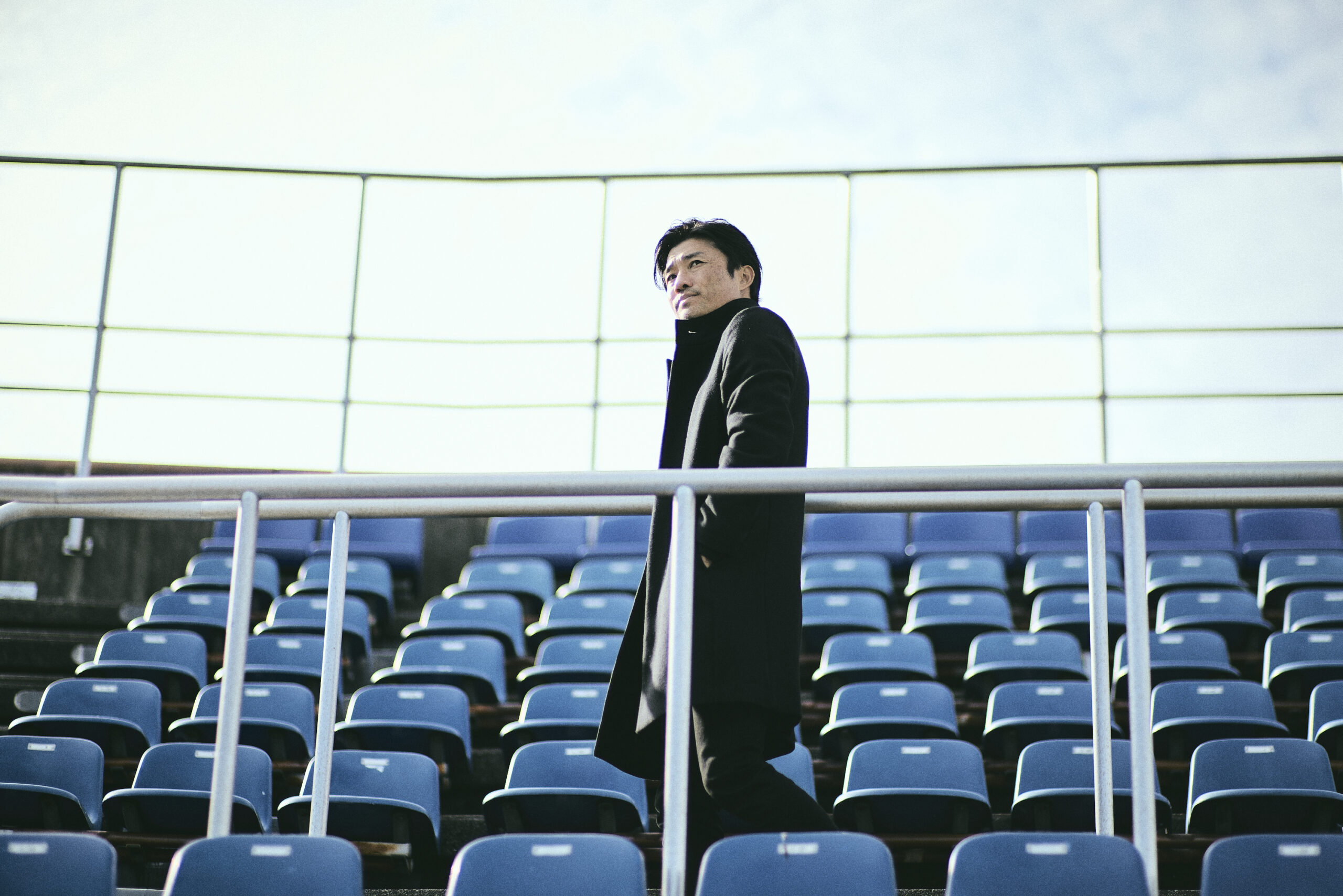
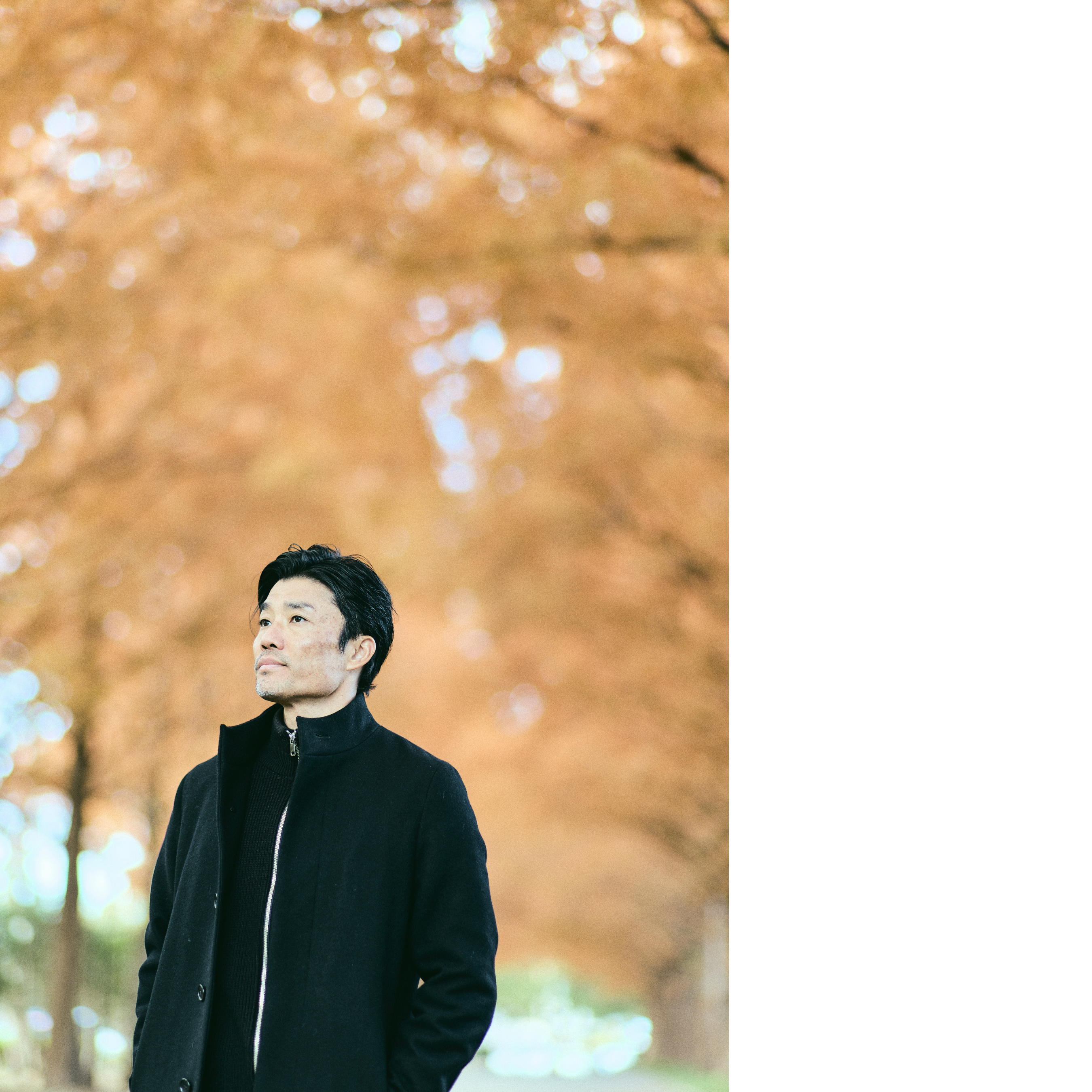
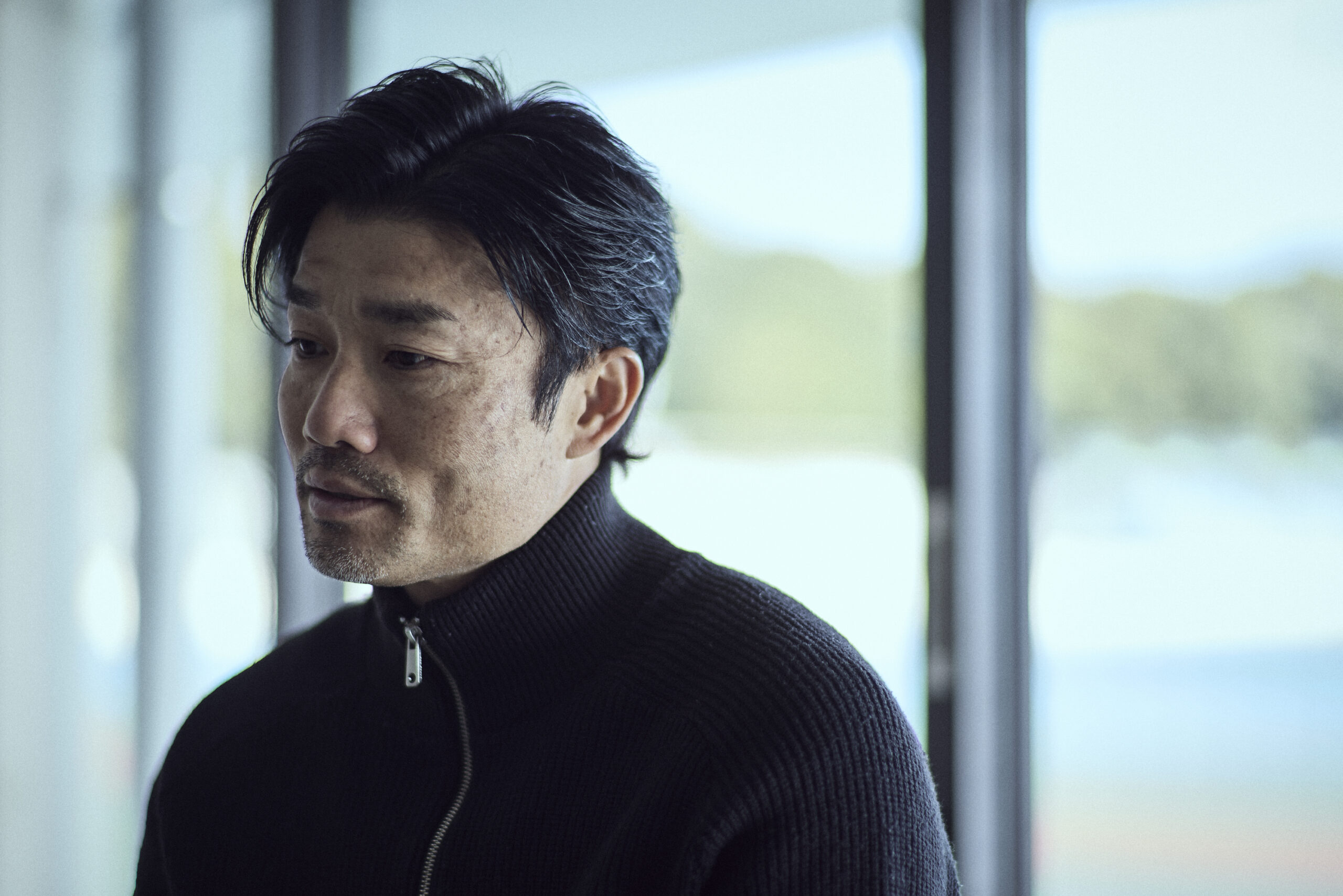
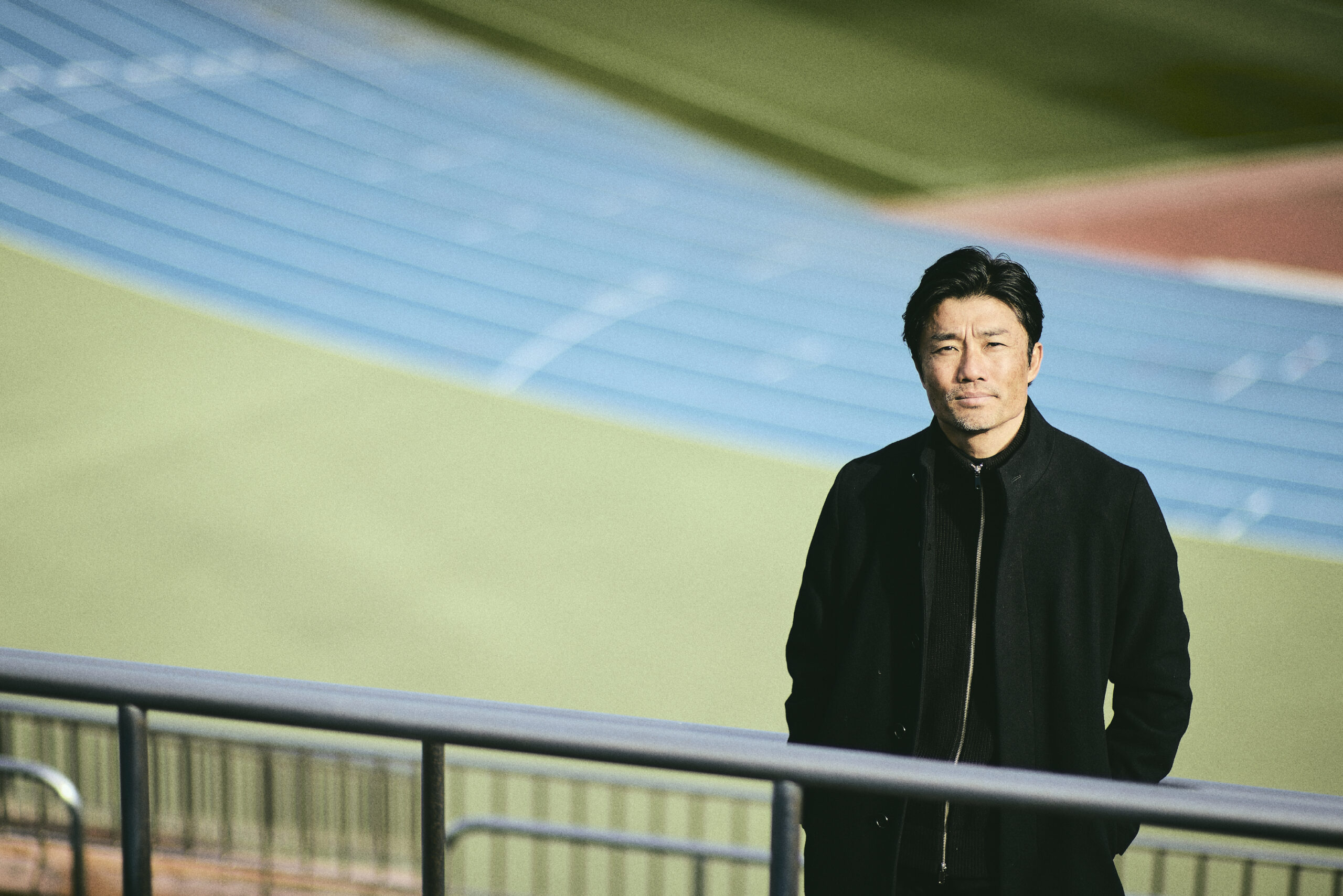
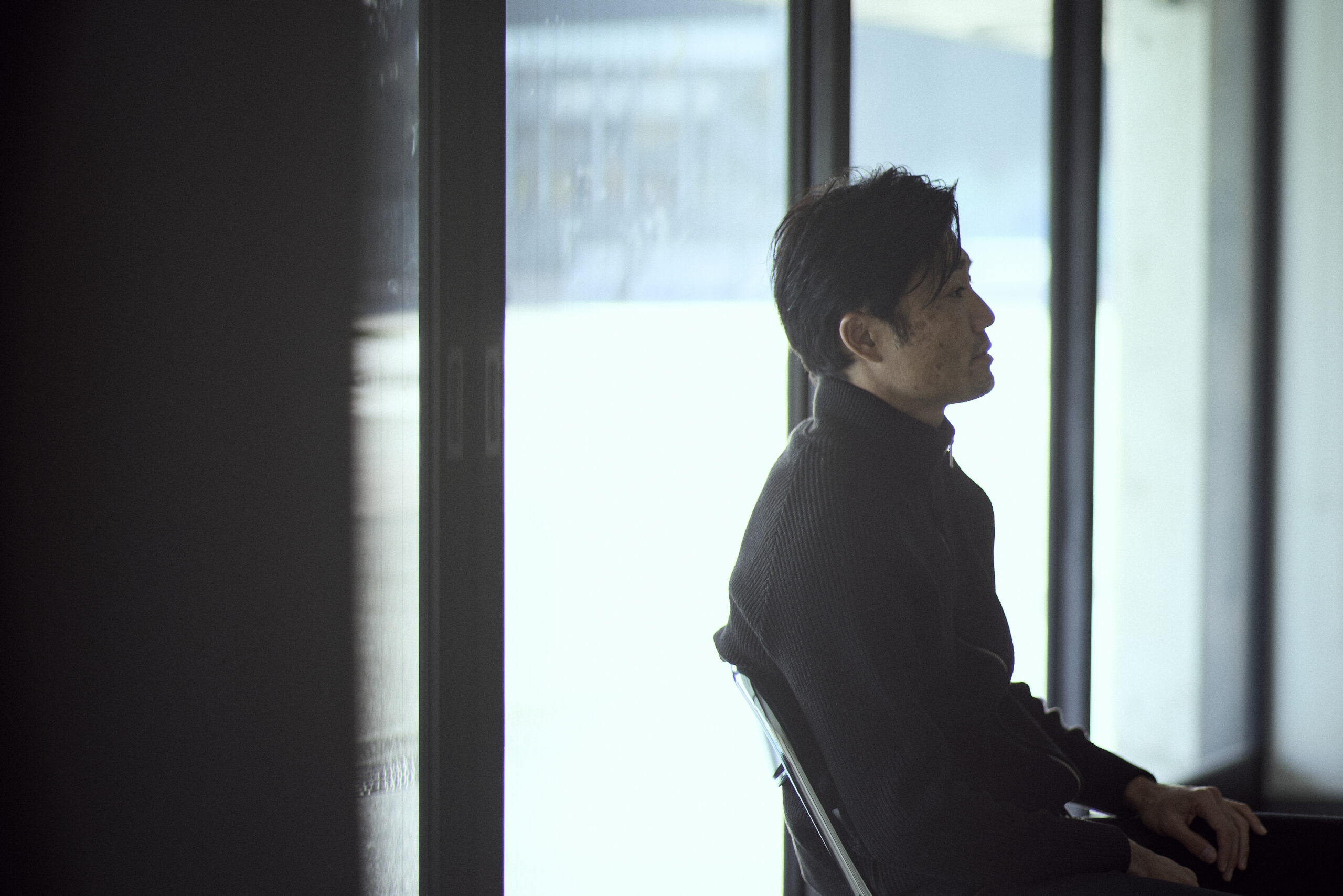
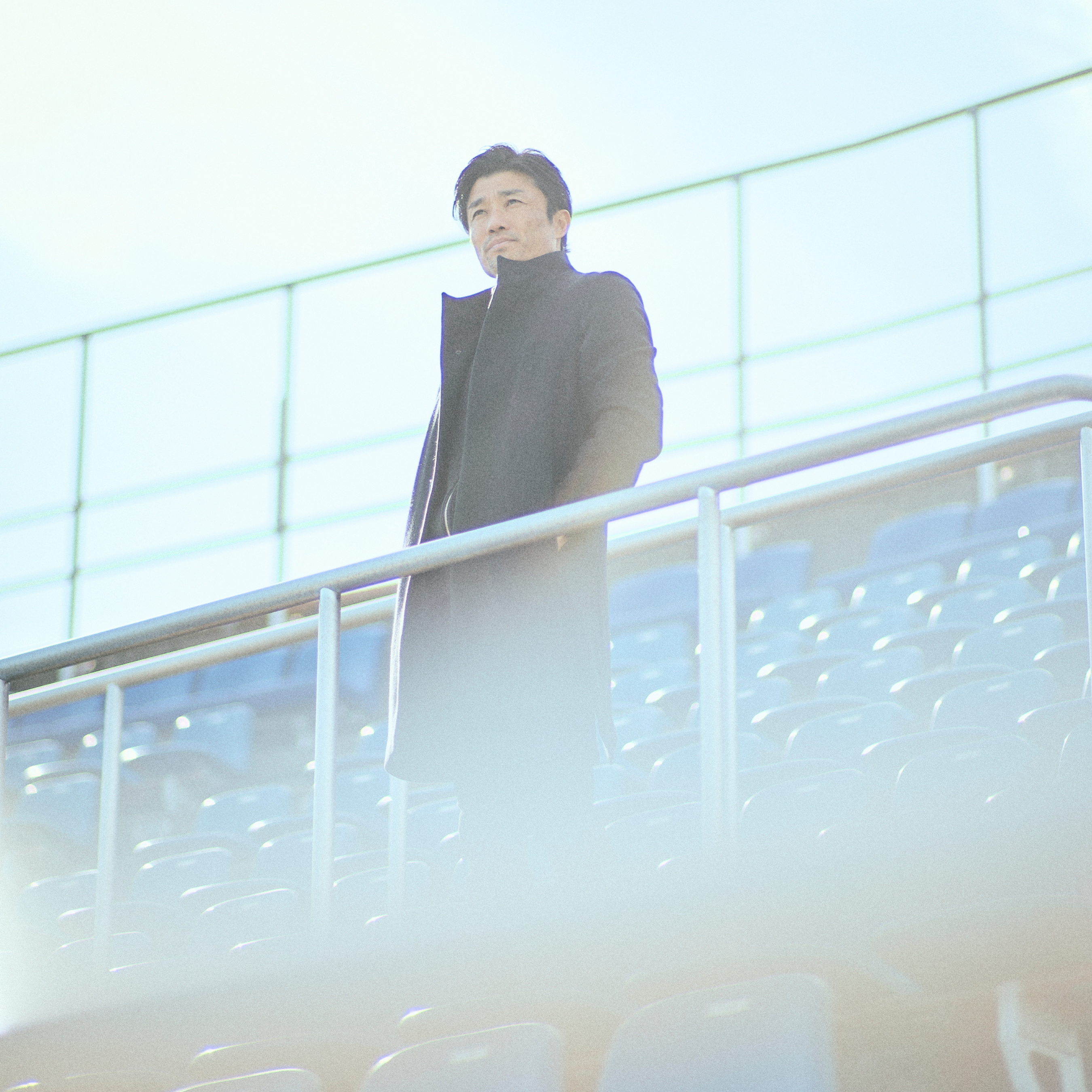
Instagram:suetsugu.shingo_official
X:@suetsugu_shingo
text by Moritaka Ohashi
photographs by Uta Mukuo
